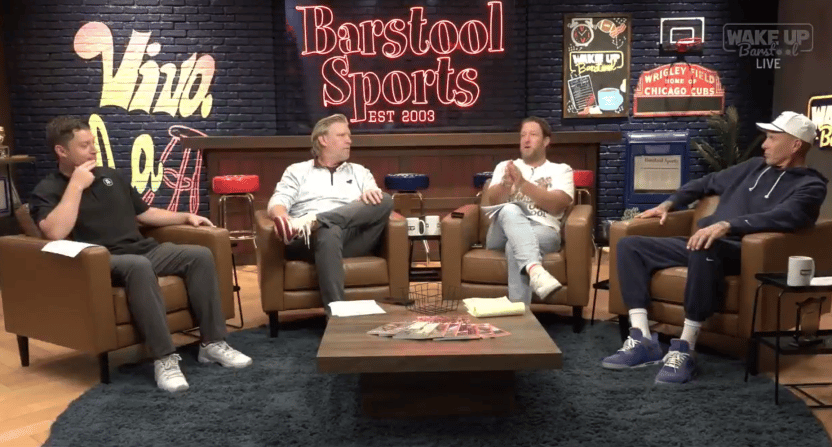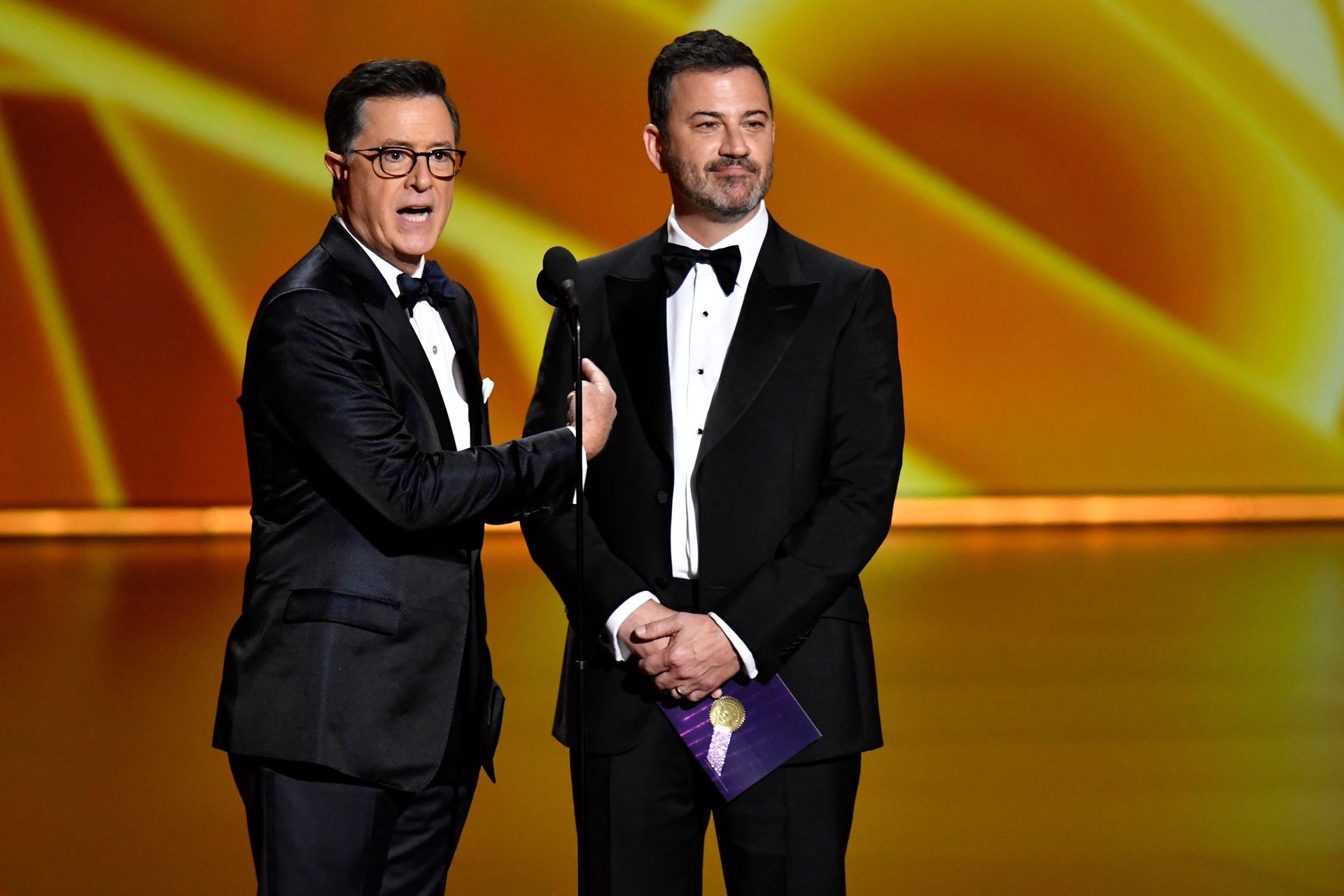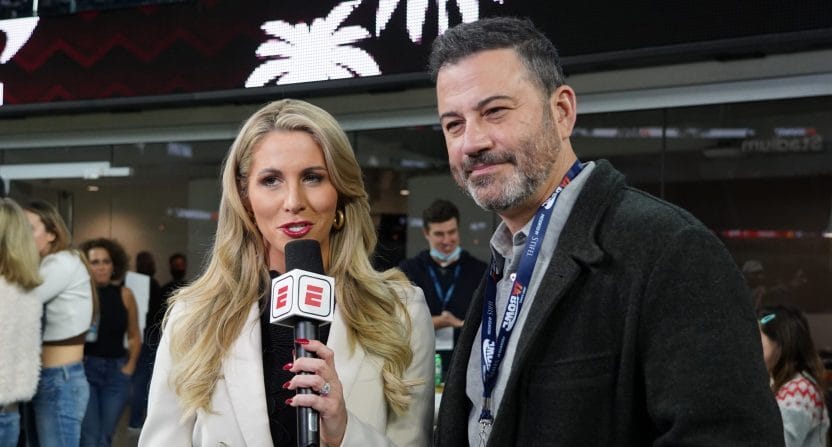Welcome to The A Block, Awful Announcing’s daily newsletter where you’ll always find the latest sports media news, commentary, and analysis.
Did someone share this newsletter with you? Sign up for free to make sure you never miss it.
🎤 QUICK START ✍️

Credit: FS1
📉 Barstool down bad. Nobody is “Waking Up” for Barstool, it appears. The second week of the show saw ratings fall through an already very low floor, averaging just 11,000 viewers per episode on FS1. Only twice did Wake Up Barstool crack the 10,000 viewer threshold last week. We’re in all-time worst territory with this one, folks.
🏀 Stan Verrett adds new gig. The former SportsCenter host is joining FanDuel Sports Network as a studio host for Los Angeles Clippers games. Verrett recently launched a new show with longtime partner Neil Everett and is also hosting New Orleans Saints pregame shows. His new FanDuel Sports Network gig will also include a weekday studio show.
📺 First Take tryouts. ESPN will reportedly take the next 30-45 days to “try a variety of in-house people” to takeover Molly Qerim’s role as host of First Take, according to ESPN content head Burke Magnus. Shae Cornette, Christine Williamson, Courtney Cronin and Monica McNutt have all previously filled in on First Take in recent years.
️🚨 LEADING OFF 🚨
Are live sports the future of late night?

Credit: Robert Hanashiro / USA TODAY NETWORK
Apologies in advance, this edition of The A Block will focus heavily on the situation surrounding Jimmy Kimmel’s (temporary?) removal from ABC’s airwaves amid pressure from local network groups by way of the FCC. In The Closer, you’ll find a column about how Disney’s impending deal with the NFL could have played a role in the company’s decision making. Up here, however, we’ll focus a bit on the future of late-night programming, and whether live sports can help fill the inevitable gap when these shows go the way of the dodo.
Here’s what we know. CBS is ending Stephen Colbert’s show in March and will not replace it with other national programming. In all likelihood, the window will be given back to local affiliates to air some mix of local news, re-runs, or even paid programming.
The fate of Jimmy Kimmel’s show on ABC is firmly up in the air. As of Thursday night, reports suggest that Disney and Kimmel met to discuss the future of his show, with the earliest return date set for next Monday. However, any return is contingent on Kimmel’s willingness to continue the show under immense political pressure.
That leaves NBC’s Jimmy Fallon and Seth Myers, both of whom are already being positioned as the Trump administration’s next targets.
At one point or another, all or most of these shows will go away. For one, the economics of late-night comedy aren’t very attractive in the year 2025. Bloomberg reports both CBS and ABC lose money on their respective shows. And with an administration that’s keen on targeting media companies it sees as problematic, and media companies that need the administration’s approval to complete any number of business dealings, it seems questions about the death of late night should lead with when not if.
So when it happens, networks will need to find something to replace these institutions. And what better way than live sports?
It’s unlikely that the major broadcast networks are going to be willing to cede this window back to local affiliates permanently. For one, not many local affiliates are equipped to add an hour of programming on already limited resources. But also, there’s just more revenue potential in something like live sports.
The NBA’s return to NBC this fall can serve as somewhat of a model. The league is scheduling two games for NBC every Tuesday, one that will tip-off at 8 p.m. ET to air on affiliates in the Eastern and Central time zones, and one that will tip-off at 11 p.m. ET to air in the Mountain and Pacific time zones. In the absence of late-night programming, wouldn’t it make sense to air the late game in the Eastern and Central time zones as well? Surely, that’d be preferable to re-runs or paid programming.
Live sports are also insulated from the politics that are proving to be the demise of late-night comedy. It would be difficult to make a good-faith argument about yanking a basketball or baseball game from network television in the same way that local network groups are currently arguing Kimmel’s show doesn’t serve their viewers. From a brand perspective, live sports would be the safest way to program that time slot without risking ire from political opponents.
To be sure, this isn’t a change that will happen overnight. These types of movement require alignment from both a league, its network partner, and in this case, the local affiliates. And given that essentially all major media rights deals are set in stone for the next few years, retooling any agreement to include late-night broadcast windows would be a heavy lift.
But down the line, live sports could start to creep into the late windows long occupied by comedians. And perhaps, that can work out well for the networks.
💬 AROUND AA 💬
Ratings battles between networks and streamers are more contentious than ever

Edit by Liam McGuire
Network executives are on edge about how Nielsen is counting viewership for its streaming competitors. And earlier this week, an upwards revision to YouTube’s Week 1 NFL audience had execs from both ESPN and Fox sounding the alarm on transparency issues.
It’s a tale as old as the Nielsen ratings themselves. But with all of the recent methodological changes and an evolving media landscape, don’t expect concern over this matter to mitigate any time soon.
Our Daniel Kaplan digs into the issue here.
📱 SOCIAL EXPERIMENT 🌟
Bussin’ With The Boys star Will Compton is still getting used to the mechanics of live television.
First Take cut Molly Qerim out of its intro for Mad Dog’s “Mad About” segment.
🔥THE CLOSER🔥
Disney, the NFL, and Jimmy Kimmel

Credit: Kirby Lee-USA TODAY Sports
The playbook deployed this week by FCC Chairman Brendan Carr may have been foreshadowed in sports media.
Earlier this year, Carr publicly pressured Comcast, one of the largest pay TV distributors in the country, to renew a deal with the New York-area regional sports channel YES Network on favorable terms for YES. In recent years, Comcast has been pushing regional sports networks to more premium, expensive tiers on its Xfinity cable packages or dropping the channels entirely if they refused. YES, the broadcast home of the New York Yankees was gearing up for the same fate until team president Randy Levine leveraged his cozy relationship with the Trump administration.
Carr quickly took to social media, publicly pressuring Comcast to get a deal done or risk retribution in the form of politically motivated lawsuits and coercive regulatory tactics that the Trump administration has made a hallmark of its dealings with media companies.
Not long after that, Comcast reached a temporary deal to keep YES Network on the more inexpensive tier through the remainder of the baseball season. The hope was that kicking the can down the road to the offseason would allow the company to negotiate a new deal without the FCC chairman breathing down its neck.
In the grand scheme, a less-than-ideal agreement with YES Network barely moves Comcast’s bottom line, so it’s easy to understand why the company would choose the path of least resistance. But alas, the blueprint had been drawn. Carr, in a break from how past FCC chairs have operated, was willing to use his bully pulpit to publicly pressure media companies to succumb to the whims of his administration.
Fast-forward to now. Carr makes one of his frequent appearances on a right-wing podcast. He publicly condemns comments that Disney star Jimmy Kimmel made about the assassination of right-wing activist Charlie Kirk. He urges local station groups to pull Kimmel’s programming. Those same local station groups, which depend on the FCC to renew their licenses and, critically, want to consolidate with one another in a manner that requires FCC approval, bow to Carr and preempt Kimmel’s show. Disney then decides to indefinitely suspend Kimmel’s show shortly after.
Like Comcast’s decision in the YES Network case, Disney also chose the path of least resistance. The company has a mega-deal with the NFL that will require regulatory approval from the Trump administration before it can proceed. Kimmel could be a sacrificial lamb.
Media observers know that late-night television is already on its deathbed. CBS is ending Stephen Colbert’s late-night show in March. It was reportedly losing around $50 million per year. The economics of late-night are no longer clear-cut. It’s unlikely that any late-night programming is breaking even from a purely financial perspective; the shows do not command the viewership that justifies the immense salaries and production budgets. Whether the prestige of airing a late-night television show and the halo effect that comes with that is valuable enough for networks to continue producing them is debatable.
What’s not debatable is that these shows are more vulnerable than ever. There’s no longer a spreadsheet to point to that justifies their existence. Instead, their value is opaque.
If that’s the financial position of late-night television, and a vindictive administration begins targeting your show when you need that same administration to approve a multi-billion-dollar deal with the biggest sports league in the country, the decision-making becomes very easy.
A deal with the NFL is of exponentially greater value to Disney than taking a principled stand to defend your late-night host. That doesn’t make any of this right. It just makes it a reality. And in this current environment, when the Trump administration has shown a willingness to turn any perceived dissent into a lawsuit, with settlements being the price of doing business, what is Disney to do?
For what it’s worth, ESPN chairman Jimmy Pitaro avoided answering a question to that effect during a conference on Thursday.
It’s all unprecedented, and it’s all deeply grim for anyone who values freedom of speech and an independent press. But this is the new normal. Any media company that wants to do business that requires federal approval will be at the whims of an FCC chair who is more culture warrior than policy wonk. And until that changes, nothing is out of bounds, and Kimmel might just be the beginning.
Thank you for reading The A Block! Sign up for free to make sure you never miss it.
